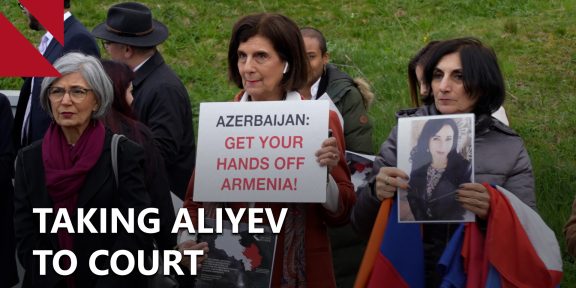By Mark Dovich
Russia’s peacekeepers in Karabakh convened direct talks Saturday between the authorities in Stepanakert and Baku, with the two sides reaching an agreement to restore the region’s supplies of natural gas and electricity.
DONATEA spokesperson for Karabakh President Arayik Harutyunyan confirmed the deal, but declined to give a date for the utilities to be restored.
“We are waiting for the corresponding steps from the Azerbaijani side, which will enable our specialists to reach the location of the power failure, assess the damage, and start repair work,” Lusine Avanesyan told the Artsakhpress news agency.
A single power line from Armenia provides Karabakh’s electricity. Likewise, a single pipeline supplies gas to the region from Armenia. Both run through areas that came under Azerbaijan’s control in the 2020 war.
The power line was damaged in early January, prompting power rationing and rolling blackouts across Karabakh. Meanwhile, the gas supply has been repeatedly disrupted and then restored throughout Azerbaijan’s blockade of Karabakh, which is now approaching its 80th day.
David Babayan, a senior advisor to Harutyunyan, commented on the news of Saturday’s deal by stressing that the talks “should in no way be considered a dialogue on political issues regarding Artsakh’s future.”
In a statement announcing the utilities deal, the peacekeepers also noted that “negotiations to resume the unhindered movement of vehicles through the Lachin corridor continue.”
The Lachin corridor is a five-kilometer-wide strip of land, formally under the control of the Russian peacekeepers, that surrounds a key regional highway. It became the only overland route connecting Armenia and Karabakh after Azerbaijan made decisive territorial gains in the 2020 war.
Azerbaijan has blocked the highway continuously since last December, effectively cutting off Karabakh from the outside world. The blockade has prompted a major humanitarian crisis in the region, including severe shortages of food and medicine. Karabakh’s human rights ombudsman said in a report last month that the blockade amounted to an attempt at ethnic cleansing.
A United Nations court ordered Azerbaijan to end the blockade last week, but the court has no enforcement powers to compel countries to follow its rulings.
The next day, Harutyunyan dismissed Ruben Vardanyan as Karabakh’s state minister, putting an end to weeks of swirling speculation that Harutyunyan was seeking to oust the billionaire businessman and philanthropist.
Harutyunyan noted at the time that “there are certain positive developments that show that this crisis can be significantly eased in the coming days,” tacitly raising the possibility that Azerbaijan may lift the blockade now that Vardanyan has been dismissed.
Azerbaijan had repeatedly demanded that Vardanyan resign or be ousted. Earlier this month, Azerbaijani President Ilham Aliyev said he would be willing to hold direct talks with Karabakh’s Armenians only if Vardanyan left office.
















